
One Year In: Zoom x Harvard
Over a year since the start of the pandemic, students reflect on their Spring 2021 experiences and life satisfaction: wellness days, mental health, plans for Fall 2021, and more.
Introduction
With reopening days coming upon us, many students are taking time to reflect on the “transformative” experience that was Harvard’s first-ever year of online school. Unlike in previous years, students were scattered across the globe, experiencing a wide variety of learning and social environments. To fully capture student sentiments and attitudes during the spring, we examined data from the Spring 2021 Undergraduate Council’s Student Experience Survey. We hope that the insights presented here can highlight areas of improvement for the future and lead to a more enjoyable Fall 2021 semester.
UC Student Experience Survey data
Each semester, the Harvard Undergraduate Council (UC) sends out a survey to the entire undergraduate student body to understand what issues students may be facing and provide feedback for the administration as they plan for the following semester. In this survey, students are anonymously asked an extensive list of questions, such as “How satisfied are you with Harvard's Spring 2021 semester so far?” and “How does the difficulty of completing your courses through online learning compare to the difficulty of in-person learning?”
The UC also publishes a report detailing their insights and recommendations for future planning. This year, HODP collaborated with the UC to produce the Spring 2021 Student Experience Survey Report. In this comprehensive report, we offered several critical insights from the Spring 2021 Student Experience Survey results. Here, we will dive deeper into the data to extract further insights with a particular focus on students’ overall satisfaction and their pandemic-era experiences.
Overall satisfaction with the Spring 2021 semester
Students were asked explicitly how satisfied they were with Harvard's Spring 2021 semester (see the outer ring of the donut plot below). Looking at the distribution of responses, we see that the majority of students were “somewhat satisfied” or “somewhat dissatisfied” with the Spring 2021 semester. Very few students — only 6% — felt very satisfied with their Spring 2021 semester. While these results are expected given the unfortunate circumstances of the pandemic, they also suggest that plenty of room for improvement exists as administration prepares for the Fall 2021 semester.
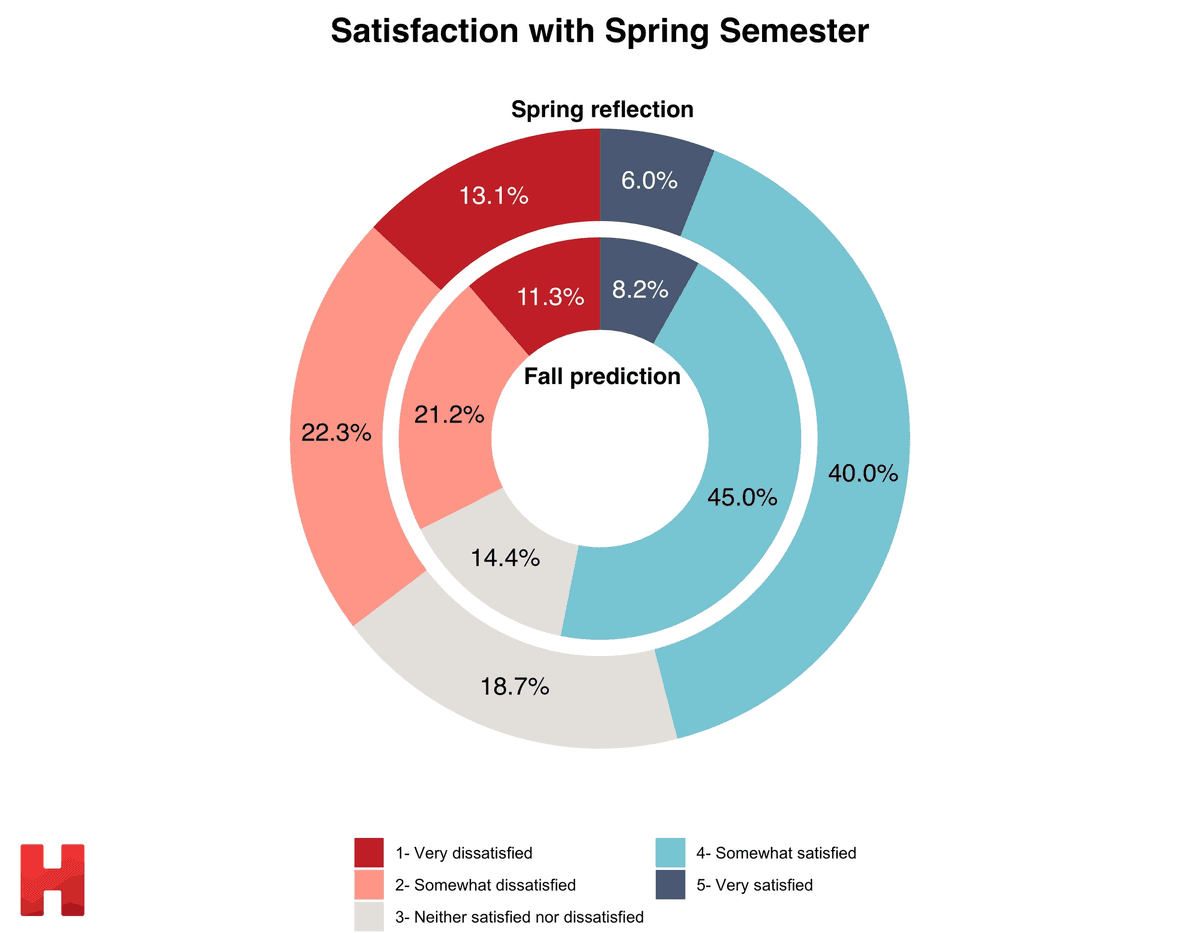
We can contrast these reported levels of satisfactions with students’ predictions for their satisfaction level back during the Fall 2020 semester. From students’ responses during the Fall 2020 UC survey, we see that reflections on the Spring semester overall seem to nearly match predictions from the Fall. However, more students were retrospectively dissatisfied in the Spring relative to their predictions from the Fall.
Students were also given space to explain which factors influenced their opinion of Harvard’s Spring semester. To summarize free responses from nearly 400 students, we can look at the words that were most frequently seen in students’ explanations. In the figure below, the 60 most frequent words or phrases are shown. Word size varies with the frequency at which that word was seen across students’ responses, with larger words being more frequent.
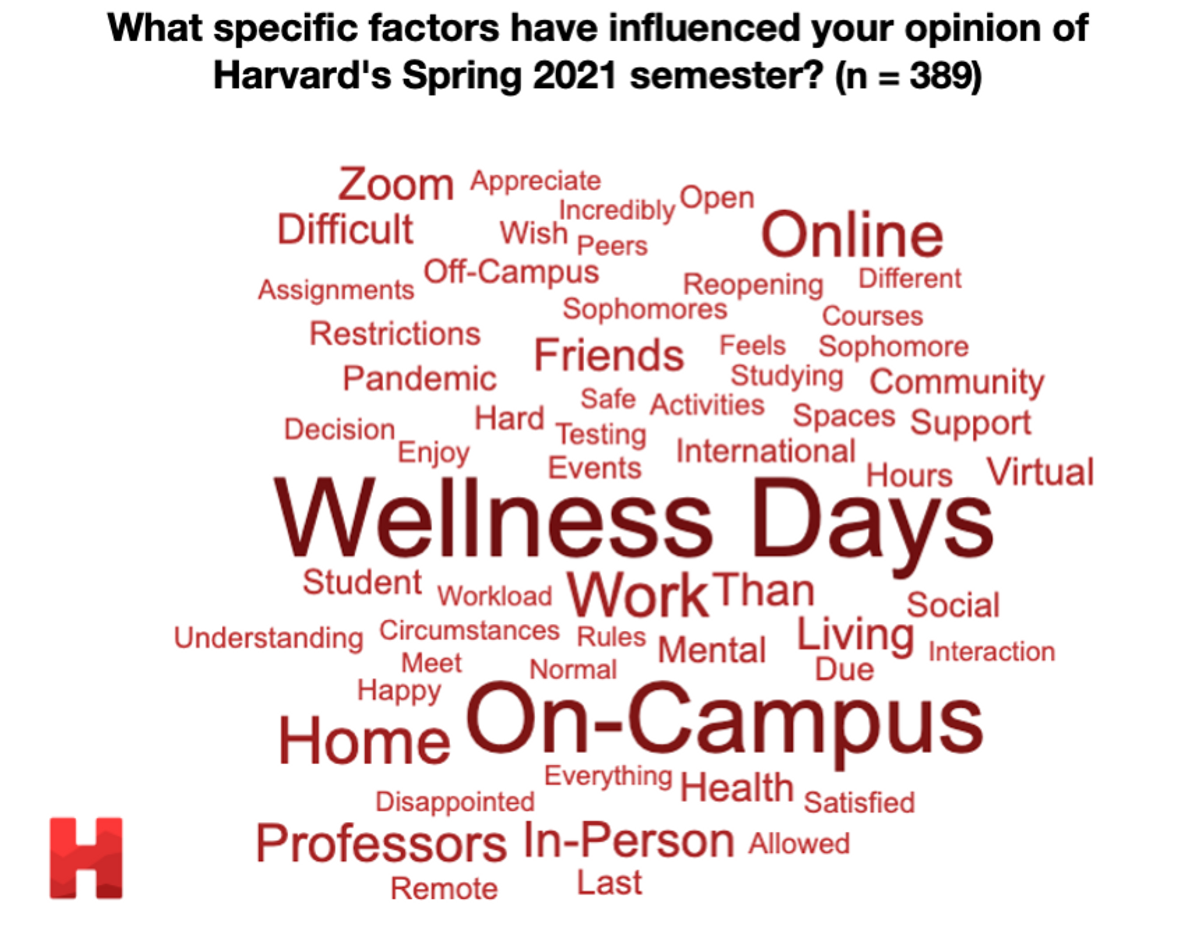
We also see words like “On-Campus,” “Remote,” “Pandemic,” and “Home,” which may stem from students’ dissatisfaction with a remote college experience. More specifically, words like “Zoom,” “Online,” “Workload,” and “Work” may point to students’ particular frustration with their isolated virtual learning experiences this year. Words like “Understanding,” “Happy,” “Mental,” and “Health” suggest that some students may be experiencing mental health issues and thus need adequate resources and support from Harvard. Finally, “International” and “Sophomores” may stem from responses that expressed frustration with Harvard’s neglect of students in these specific categories. These speculations made regarding student sentiments are largely supported by further data discussed next.
Disliked elements of Spring semester
It is useful to pinpoint exactly which elements of the Spring 2021 semester affected students’ satisfaction levels the most in order to provide specific areas for improvement in the Fall 2021 reopening plan. Students were asked to rate specific elements of the Spring semester on a scale from 0 to 10, where 0 represents extreme dissatisfaction and 10 represents extreme satisfaction.
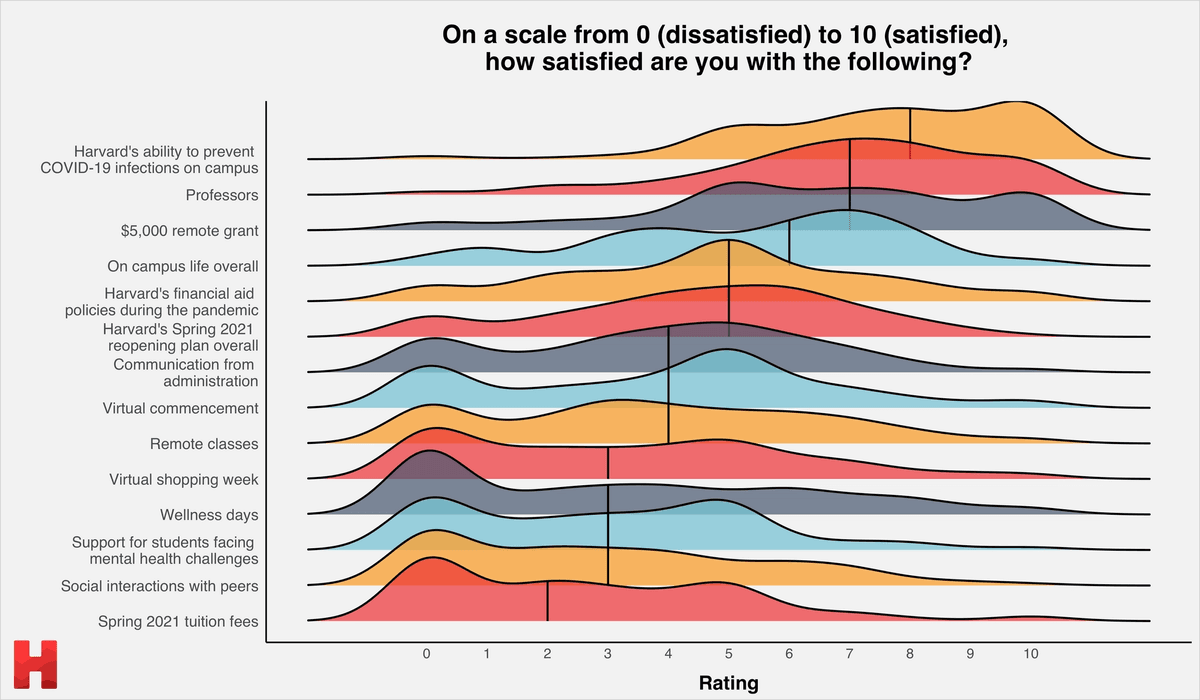
Of the categories included in the figure above, students seemed to be most satisfied with Harvard’s ability to prevent COVID-19 infections on campus, with the most common rating (> 25%) being “10.”
As expected, students were dissatisfied with the elements of a remote pandemic-era semester: virtual commencement, remote classes, and virtual shopping week.
Students again seemed to disapprove of Harvard’s decision to institute Wellness Days during the Spring 2021 semester (median rating: 3), suggesting that Wellness Days should no longer be incorporated into future reopening plans. Moreover, there was dissatisfaction with the support provided to students facing mental health challenges; this is likely a key area that Harvard must focus on in the future.
It is important to note that within nearly all of the categories in the figure above, there is a peak around the “0” (dissatisfied) rating that is separate from any other peaks in the distribution. This may highlight a neglected group of students within each of these categories (e.g. international students), emphasizing the need for comprehensive improvement across the board.
Student mental health
Students were asked to rate their satisfaction with their social life and living situation as a Harvard student in comparison to past years. As in past questions, students were given 5 options: extremely satisfied, somewhat satisfied, neither satisfied nor dissatisfied, somewhat dissatisfied, and extremely dissatisfied. For the purposes of our analyses, we labeled these categories as “Satisfied,” “Neutral,” and Dissatisfied,” combining “somewhat” and “extreme” ratings into one group.
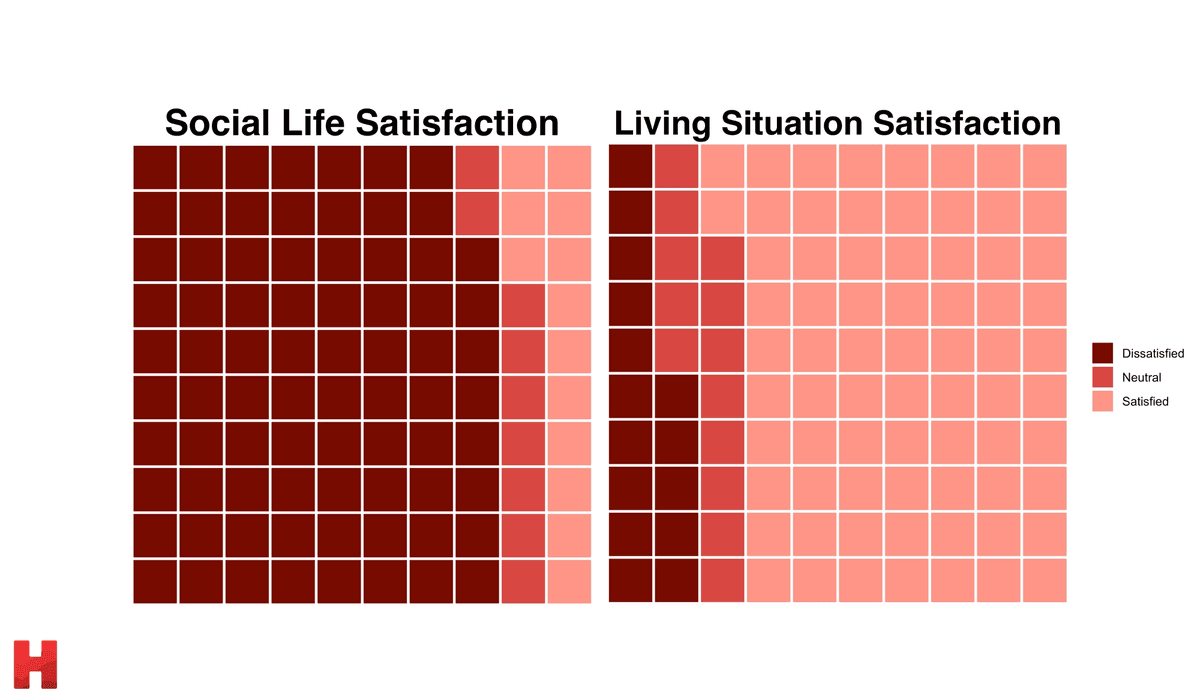
Nearly 80% of students reported feeling dissatisfied with their social life as a Harvard student, though the majority of students felt satisfied with their living situation for the semester. This suggests that Harvard effectively met the housing needs of students that had inadequate learning environments and/or that the majority of Harvard students had adequate remote learning environments to begin with. Regardless of living situation, the majority of students were dissatisfied with their social life, a common theme of the data collected.
In the previous ridge plot, we saw that students were dissatisfied with the mental health support provided by Harvard during the Spring semester; this highlights a crucial concern among the student body and demands a closer look. In the UC Survey, students were asked about some of their experiences regarding daily life during the Spring semester, shown in the graph below.
This clearly emphasizes a need for adequate support and resources for students facing mental health challenges.
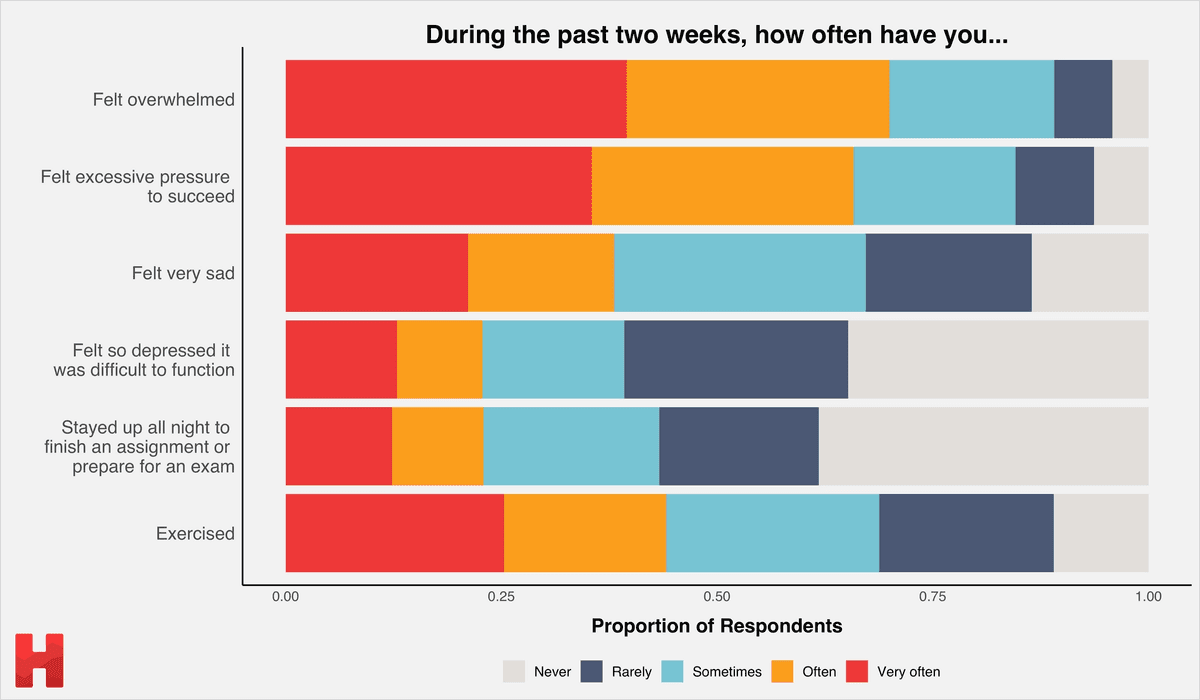
The academic rigor of classes has persisted into the remote semester, with nearly a quarter of students frequently staying up all night to study for exams or finish assignments. At the least, it is reassuring to see that most students sometimes exercise during the busy semester.
Satisfaction among different student groups
Given the wide variety of living situations and learning environments that students were in this past Spring semester, it is expected that satisfaction would vary across different student groups (see figure below). On a scale from 1-5, with 1 being very dissatisfied and 5 being very satisfied, we first calculated the mean satisfaction of all Harvard students to be 3.04 (average of all student satisfaction ratings). We then calculated mean satisfaction within different groups across the student body, such as international students, FGLI students, students living on-campus, etc.
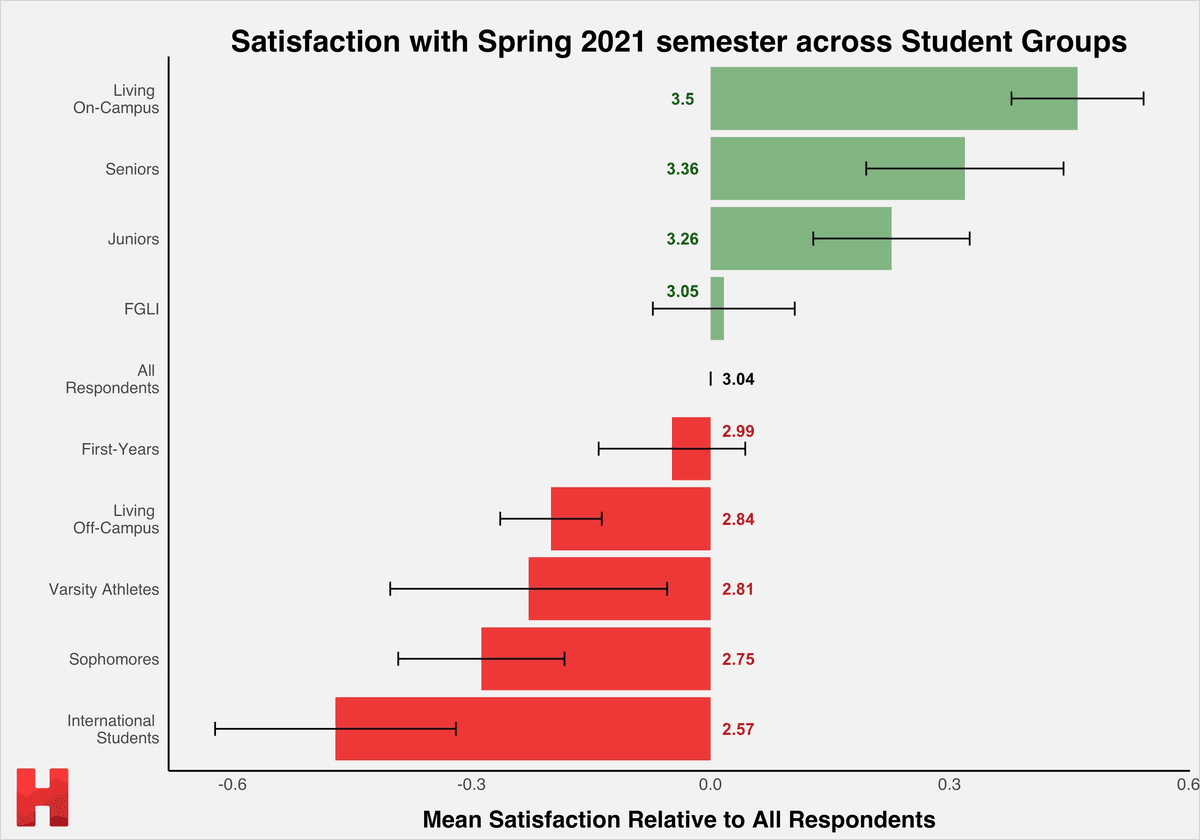
In the figure above, the overall mean student satisfaction score is centered at 0, and the relative mean satisfaction within different groups of students is shown (with standard error bars).
Contrastingly, those living off-campus and sophomores, who were not invited back to campus at all this year, had lower than average satisfaction levels. Furthermore, the satisfaction levels among international students is significantly lower than the overall student satisfaction (p-value = 0.001364), suggesting that international students felt neglected and particularly dissatisfied with Harvard’s efforts to provide a meaningful remote semester.
Virtual learning
We can now focus on students’ actual learning environments during the Spring semester. We first look at the time that the average pandemic-era Harvard student spends doing various common activities. It is also interesting to see if a difference in time allocation exists between students on and off campus (see figure below).

Out of all the activities, academic coursework seemed to take up the majority of students’ time — nearly 37 hours/week. No significant difference was found in time allocated to coursework between on- and off-campus students. Students also spent nearly 10 hours/week on social media; on-campus students reported spending significantly more time on social media than off-campus students (p-value = 0.01993), perhaps because students on-campus felt more connected with their peers. As one might also expect, on-campus students spent significantly more time socializing in-person than those off campus (p-value = 0.0001443). Interestingly, the time spent socializing remotely (roughly 3 hours/week on average) did not differ significantly between on- and off-campus students.
It is also interesting to look at how students are engaging with the various resources provided to them during the Spring semester. In the figure below, we see that students are most frequently engaging with remote classes and extracurriculars. Office Hours (OH) are attended by most students less than 1 day/week, and very few individuals have participated in Club sports. Students also rarely seem to engage with the Academic Resource Center and Harvard University Health Services. Despite several Houses’ efforts to host social events, students seem to rarely engage with these events. Ultimately, as one might have expected, the remote semester has created a lack of engagement with most resources on campus.
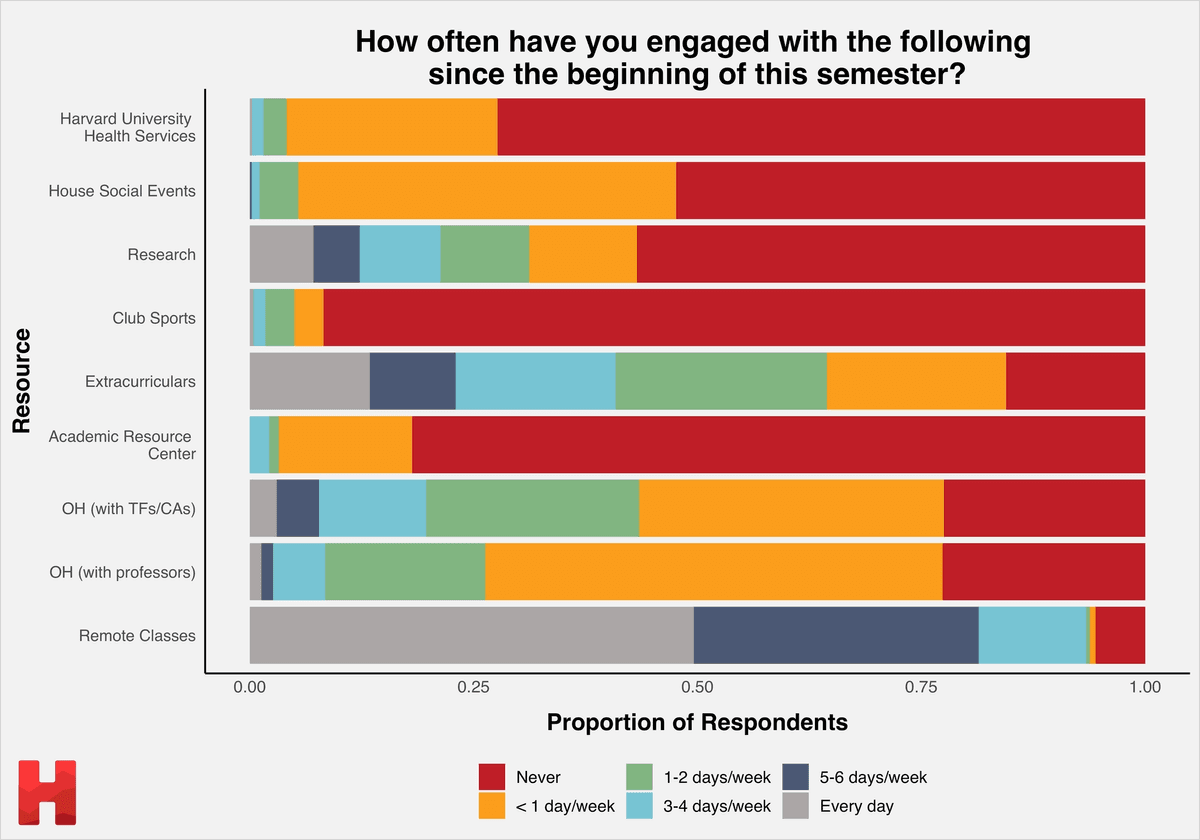
Future planning
We were curious how much students’ satisfaction with the Spring semester impacted their plans to enroll in the upcoming Fall semester. We considered the correlation between student satisfaction and their plans to enroll in the Fall semester in the alluvial plot below.
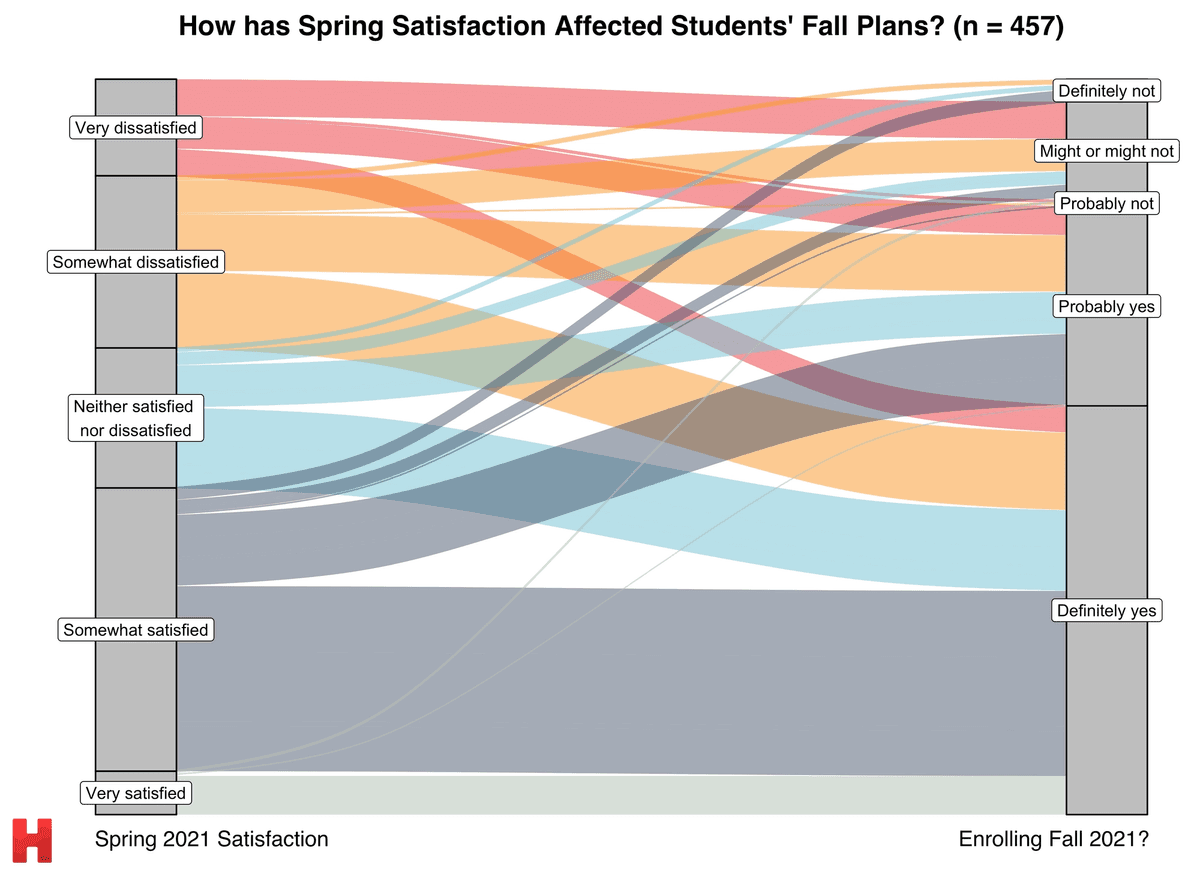
We see that nearly all students who feel very satisfied with the Spring semester definitely plan to enroll next year, while few of those who were very dissatisfied definitely plan to enroll. Of note, students who are somewhat dissatisfied with the Spring semester still likely plan on enrolling in the Fall semester.
This may be due to a persisting hope that the in-person Fall 2021 experience will be better, especially with the increased supply of vaccines in America, or simply feeling obligated to continue on despite an overwhelmingly negative Spring semester. Regardless, the fact that most students still plan to enroll next year emphasizes the need for Harvard to come up with an improved reopening plan for the upcoming semester.
Conclusion
Capturing the sentiments and attitudes of the student body via periodic surveys such as the UC’s is crucial, as it creates a more transparent academic environment and provides the administration with key, actionable feedback that informs future planning. Many students have strong feelings regarding Harvard and virtual learning. While those living on-campus seemed to fare better than those off-campus, many were dissatisfied overall with the Spring semester. They felt that their mental health became a large concern and that social life was near nonexistent. The overwhelming majority of students hope for a return to a near-normal campus in Fall 2021. International students and the class of 2023 in particular felt underserved; Harvard should make these groups a priority in the coming semester. Regardless, students seem reluctant to take time off from Harvard in the Fall. This last note of optimism for the upcoming semester makes it all the more important that Harvard adjusts reopening plans to better fit students' needs come Fall 2021.
